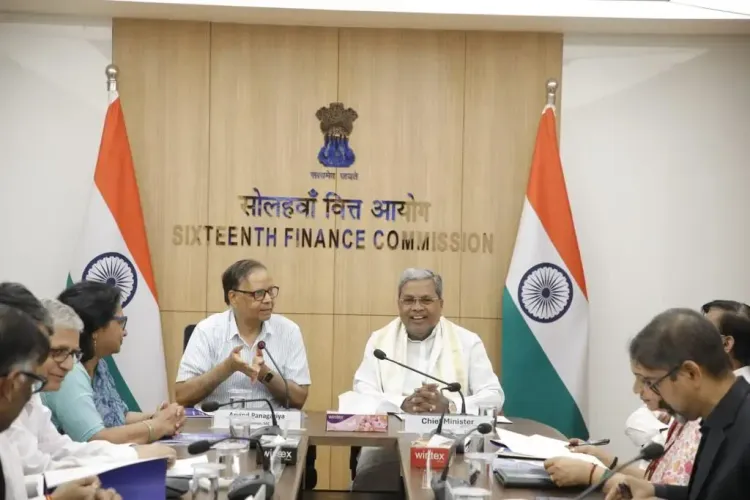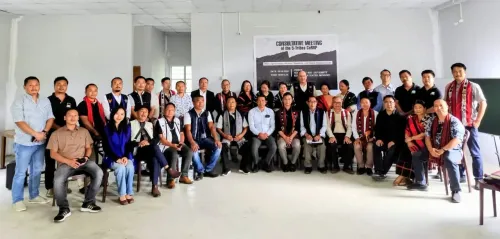How is Karnataka CM Engaging with the 16th Finance Commission for Tax Devolution?

Synopsis
Key Takeaways
- Karnataka asserts the need for balanced tax devolution.
- The state contributes significantly to national GDP.
- Proposals include increasing tax share for states.
- Karnataka faces fiscal inequity in tax returns.
- Regional disparities must be addressed.
Bengaluru, June 13 (NationPress) Karnataka Chief Minister Siddaramaiah engaged with the Chairman of the 16th Finance Commission, Dr Arvind Panagariya, and the Commission members in New Delhi to voice the State’s concerns, expectations, and proposals regarding tax devolution and financial transfers from the Centre.
Also present were Basavaraja Rayareddy, the Economic Advisor to the Chief Minister, the Chief Secretary, and senior officials from the Chief Minister’s Office and the Finance Department.
The Chief Minister stressed that there should be a balance between growth and equity, asserting that a robust Karnataka — backed by equitable fiscal devolution — is crucial for a stronger India.
“Karnataka’s fiscal capacity drives national advancement. It is crucial that growth is rewarded rather than penalised. We implore the Commission to embrace a balanced and progressive approach to devolution,” the CM remarked.
During their discussions, the CM provided an additional memorandum outlining the State’s vision for a fair, transparent, and growth-promoting fiscal federal structure.
In addressing the Commission, the Chief Minister highlighted Karnataka’s significant contribution to India’s economic progress — accounting for nearly 8.7 percent of the national GDP with merely 5 percent of the population, and ranking second in GST collections nationwide.
Despite this substantial contribution, he noted a glaring imbalance in fiscal returns: for each rupee Karnataka pays in Union taxes, it receives only 15 paise in return. The CM pointed out that the reduction in Karnataka’s share under the 15th Finance Commission — from 4.713 percent to 3.647 percent — led to a cumulative loss exceeding Rs 80,000 crore during the award period.
Karnataka's main memorandum proposes increasing the share of taxes devolved to states (vertical devolution) to at least 50 percent and capping cesses and surcharges at 5 percent. The State also recommends including Union non-tax revenues in the divisible pool.
For equitable fund distribution among states (horizontal devolution), Karnataka advocates that each state retains around 60 percent of its contributions, with 40 percent allocated to less-developed states, ensuring both growth and equity, as stated by the CM.
To enhance fairness in the formula, Karnataka has suggested lowering the weight of the income-distance criterion and assigning more weight to a state’s economic contributions, thereby encouraging high-performing states instead of penalising them.
In its additional memorandum, Karnataka has called for vital reforms aimed at making the fiscal devolution system more growth-centric, predictable, and equitable. The State has identified three critical issues: the widening disparities in per-capita devolution, the flawed design of Revenue Deficit Grants, and the unpredictable nature of State-Specific Grants.
The CM noted that Karnataka's per capita devolution has sharply declined — from 95 percent to 73 percent of the national average between the 14th and 15th Finance Commissions, despite an increase in GDP contribution.
Karnataka stressed that while equity is a fundamental principle, it should be implemented in a timely and outcome-oriented manner, without disadvantaging states with strong economic performance and sound fiscal management. Consequently, Karnataka has proposed reducing the income-distance weightage by 20 percent and reallocating it to better reflect states’ fiscal contributions, gauged by their share in national GDP.
The CM questioned the effectiveness of Revenue Deficit Grants, pointing out persistent deficits in beneficiary states and advocating for the redistribution of these grants through horizontal devolution using the same formula applicable to all states.
“Our government is inspired by Gandhiji’s philosophy of Sarvodaya, which promotes the welfare of all. By empowering lower-income households, these initiatives enhance local demand and drive inclusive growth. Hence, these welfare expenditures should be treated equally, if not prioritised over, committed expenditures like salaries, pensions, and interest payments in fiscal evaluations,” the CM emphasised.
Karnataka has also proposed replacing discretionary special grants with a formula-based allocation of 0.3 percent of Gross Union Receipts. Nevertheless, the state has reiterated its demand for grants for Bengaluru and other key projects if the Commission continues such provisions.
The CM requested support for a Rs 1.15 lakh crore investment aimed at bolstering Bengaluru’s infrastructure, acknowledging its crucial role in the state's economy.
He also underscored the importance of addressing regional disparities in Kalyana-Karnataka and Malnad, which are grappling with low incomes and inadequate infrastructure.









